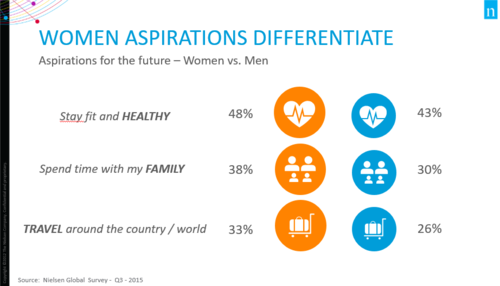Nielsen covers role of females in mega-trends at the “Davos for women”
The role of women in various global and regional “mega-trends” is a key theme presented by Nielsen at the latest annual Global Summit for Women, today in Warsaw.
“Women will be the key factor in future change and growth around the world: by 2020 women will control $28 trillion of global consumer spending and 90 million additional women will enter the global workforce in the next two years*,” explains Marie Lalleman, Nielsen’s SVP managing director global retailers. “Major changes around the world are taking place in regards to women’s role in society – cultural, economic, religious and political – and no-one can afford to ignore this structural shift.”
The global and regional “mega-trends” include the hugely disparate levels of consumer confidence around the world, the exploding size of the middle class (particularly in Africa and Asia), the rise of urban living, the increasing importance of sustainability, the shifting of geopolitical and economic power from West to East, and the increasingly connected and technology-dependent world.
Some of the points Lalleman covers include:
• Five years: that’s the timeframe in which the global income of women will grow twice the expected GDP of China and India combined.
• Couple this growing economic power with attitudinal changes and gains being made in the working world and in politics, and it’s clear that the woman of tomorrow will be in a position to exert more influence than ever before.
• Connectivity is now in our universal DNA and increasing numbers of women with mobiles will have a significant impact on their development and economic dynamics.
• Sustainability is a strong focus for consumers, particularly from east and emerging countries: 20% of women are willing to pay more for brands that commit to sustainability, while 28% say the product being made from fresh, natural and/or organic ingredients influences their purchase decision
• As women will be a key factor of change and future growth, it’s important to create an ecosystem where aspirations and priorities different to men can be fulfilled – a key difference is the 2nd biggest aspiration for men – MAKE MONEY – isn’t among the top aspirations for women (see below).
Lalleman also points out, that despite these factors, women around the world are less optimistic than men about their personal situation and their country’s economic outlook.
According to Nielsen’s latest global Consumer Confidence Index, which measures attitudes each quarter on topics including personal finances and job prospects among 30,000+ internet consumers in 63 countries, women score 94, compared to men at 101.
A score over 100 indicates degrees of optimism, below 100, degrees of pessimism.
When it comes to the next 12 months, just 43% of women globally are positive about their job prospects, compared to 51% of men, and 54% are positive about their personal finances, compared to 59% of men.
The summit is the foremost international forum for the exchange of best practices to accelerate women’s economic progress worldwide. Dubbed the “Davos for women”, the summit is in its 26th year and over 1,000 women from business and government are expected to attend from 60-70 countries, along with 30+ government Ministers.
“My theme at the summit is to suggest what we should be doing about these global mega-trends to the benefit of business, countries and people – especially women,” concludes Lalleman. “For example, there’s still a connectivity gap in parts of Africa and Asia for women who are much less likely than men to have a mobile phone. We need to address that to advance women’s digital and financial inclusion – particularly in countries with mobile money networks – to unlock significant growth potential as women play such a key role in purchase decisions.
“These mega-trends are changing our world at high speed. Success requires changing the business models we interact with – moving from competition to competitive collaboration to face the challenge of efficiency yet creativity without losing time on duplication. This collaborative mindset requires confidence, trust and leadership...women have the opportunity to embrace these trends.”
To view historical Consumer Confidence trends for all countries, broken down by metrics such as financial concerns and job prospects, visit the interactive Nielsen Global Consumer Confidence Trend Tracker.
*Source: Harvard Business Review
Alex Burmaster: Meteor Public Relations, T: 020 3544 3570, M: 0780 313 1144, alex@meteorpublicrelations.com
